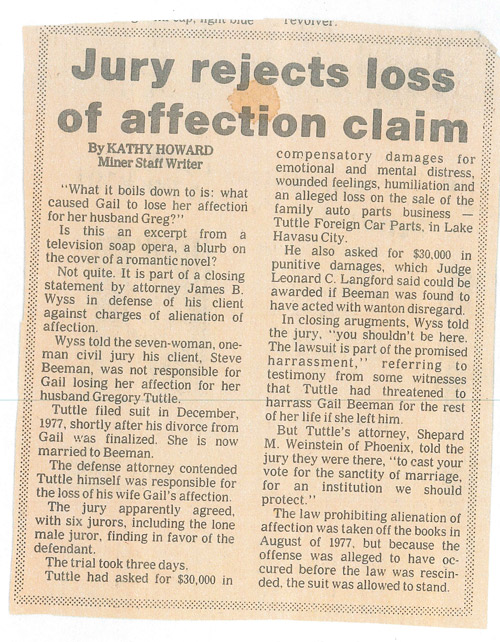The short answer is no. A person could have filed this type of a lawsuit until 1977, when the Arizona legislature abolished the law.
James (J.B.) Wyss, one of the founders of Wachtel Biehn & Malm, had the privilege to defend a client against the common law claim of Alienation of Affection before the state of Arizona abolished the law in August 1977 (§A.R.S. 25-314). Alienation of Affection is a civil lawsuit a married person would file against a third party who wrongfully interfered with the married couple’s affection for each other, and as a result of this interference, the marriage failed. For example, Elaina Woods (Tiger Woods ex-wife) could have filed a lawsuit against the women that caused their marriage to dissolve. Conversely, the husband of the woman Tiger Woods had an affair with, could sue Tiger Woods for creating problems in their marriage.
The plaintiff in these types of cases were required to prove: the spouses were happily married and a genuine love and affection existed, the love and affection was alienated or destroyed, and the wrongful acts of the defendant caused the marriage to fail. JB Wyss’s client, Steve, was being sued by Greg because Steve allegedly alienated Gail’s affection for Greg. The Plaintiff, Greg, asked for compensatory damages of $30,000.00 for emotional and mental distress, wounded feelings, humiliation and alleged loss on the sale of the family business.  Additionally, the Plaintiff asked for $30,000.00 in punitive damages. The jury was comprised of 7 women and 1 man. The trial took 3 days and the jury found that Steve was not responsible for Gail losing her affection for her husband Greg. This was the last Alienation of Affection case in Arizona because the law was abolished in August of 1977. You may be thinking, well the news article above says 1980, how could that be…Well, the lawsuit was allowed to continue because the alleged offense happened before the law was abolished. This is what makes this case legal history not only for Lake Havasu, but for the entire state of Arizona. There is a common misperception that lawyers regularly go to trial; however, almost 90% of cases end up resolving before the trial begins, so it is a very rare occasion when a case actually makes it to trial and even rarer when the jury reaches a verdict. In most cities a trial lawyer will only have 1-2 trials in a year.
Additionally, the Plaintiff asked for $30,000.00 in punitive damages. The jury was comprised of 7 women and 1 man. The trial took 3 days and the jury found that Steve was not responsible for Gail losing her affection for her husband Greg. This was the last Alienation of Affection case in Arizona because the law was abolished in August of 1977. You may be thinking, well the news article above says 1980, how could that be…Well, the lawsuit was allowed to continue because the alleged offense happened before the law was abolished. This is what makes this case legal history not only for Lake Havasu, but for the entire state of Arizona. There is a common misperception that lawyers regularly go to trial; however, almost 90% of cases end up resolving before the trial begins, so it is a very rare occasion when a case actually makes it to trial and even rarer when the jury reaches a verdict. In most cities a trial lawyer will only have 1-2 trials in a year.
Most states have abolished this common law action because it was used primarily for revenge and did not perform any real function to protect married couples. The opposite actually occurred; the divorce lawsuits would be even more contentious because there was a legal cause to “air the dirty laundry”. Even though most states have abolished this law, there are still several states which allow this lawsuit: Hawaii, Illinois, Mississippi, New Mexico, North Carolina, South Dakota, and Utah. In North Carolina there is supposedly over 200 lawsuits filed each year claiming Alienation of Affection. Some of these lawsuits actually end up with massive settlements or jury verdicts. In March 2010, Cynthia Shackelford obtained a $9 million dollar verdict against her husband’s alleged mistress.
Who writes these laws?
The laws have changed dramatically since Arizona became a state in 1912. Preparing to write this article I googled “Arizona Crazy Historic Laws” and the following are the top five: 1) hunting camels is prohibited; 2) any misdemeanor committed while wearing a red mask is considered a felony; 3) there is a possible 25 years in prison for cutting down a cactus; 4) donkeys cannot sleep in bathtubs; and 5) No one is permitted to ride their horse up the stairs of the county court house. These so called “crazy laws” could not be verified in any Arizona statute or city ordinance. These must have been extremely old laws… if they ever were laws.
Article provided by Richard C. Rahnema at
the law offices of Wachtel Biehn & Malm. Visit
www.wmblaw.com for more information.
This article is provided for general educational and informational purposes only. This article does not constitute legal advice. Publication of this information is not intended to
create, and the receipt does not constitute, an attorney-client relationship between publisher and reader. These materials are intended, but not promised or guaranteed to be
current, complete, or up-to-date. You should not act or rely on any information in this article without first seeking the advice of an attorney


